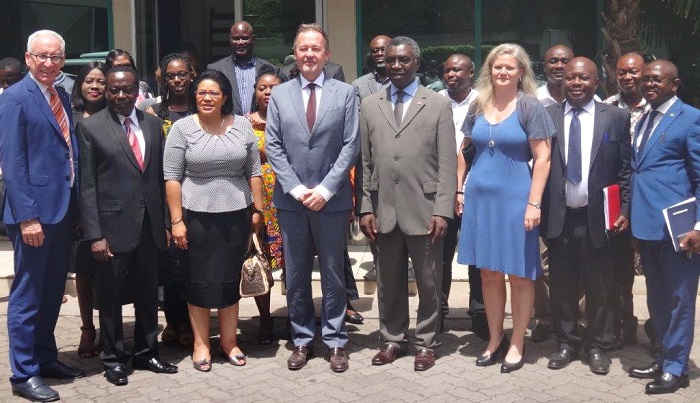
Germany supports Ghana with €25 million to tackle e-waste menace
Germany is to support Ghana with €25 million euros to tackle its growing electronic waste menace.
Advertisement
The fund is to support the establishment of structures for the effective collection and recycling of e-waste, which had become an environment and health threat in the country over the last decade.
The Ambassador of Germany to Ghana, Mr Christoph Retzlaff, announced this during a meeting with the Minister of Environment, Science, Technology and Innovations, Professor Frimpong Boateng, and other stakeholders in Accra.
The support includes funding for a pilot programme that seeks to alleviate the environmental impact of electronic waste in Ghana for at least three years.
The initiative comes on the heels of the passage of the Hazardous and Electronic Waste Law in 2016.
E-waste
Ghana e-waste country assessment estimated that the country received 215,000 tonnes of e-waste comprising 30 per cent new products and 70 per cent second-hand, as of 2009.
According to Mr Retzlaff, the partnership between Ghana and Germany was a decision by the two countries to strengthen cooperation in the field of electronic waste management and recycling.
“Germany wishes to use this opportunity to congratulate Ghana on passing this ground-breaking law, which translates the Basel convention on the control of transboundary movements of hazardous wastes and disposal into national law,” he stated.
Breakdown
Mr Retzlaff said: “Germany will commit 5 million euros for a technical cooperation programme. Furthermore, 20 million euros will be dedicated to the establishment of an incentive mechanism for sound collection and recycling of e-waste as well as for a collection centre in Ghana.”
He explained that the 5 million euros component to be implemented through the Deutsche Gesellschaft fur Internationale Zusammenarbeit (GIZ) was aimed at improving the conditions of workers along the electronic waste value chain, supporting private sector engagement in recycling industries and developing the framework conditions to implement the newly passed e-waste law.
The 20 million euros component will be implemented through KfW Entwicklungsbank (KfW), a German development bank.
“Both elements of the programme are intended to prepare the establishment of the Ghanaian recycling fund as stipulated in the waste law,” Mr Retzlaff stated.
Significance
For his part, Prof. Boateng described the project as timely, considering the enormity of challenges the country was currently facing in managing its e-waste.
“The burning of e-waste fractions leads to the release of toxic gas into the atmosphere which invariably affects our health.”
“You will agree with me that the urgent need for sound management and disposal of toxic electronic waste increases by the day as a result of an ever increasing use and application of electrical and electronic equipment by the populace,” Prof. Boateng said.
He said other government interventions such as the collection of the pre-shipment levies on e-waste would continue as part of efforts to manage the situation.
Situation
Currently, Agbogbloshie, located in the heart of the national capital, Accra, is a hotbed for indiscriminate e-waste recycling, making the area one of the most polluted in the world.
For instance, an environmental campaign group, Greenpeace, made some analyses on soil and water samples from the area and found out that there were high concentrations of lead, plastic softeners and dioxins that are known to promote cancer.



